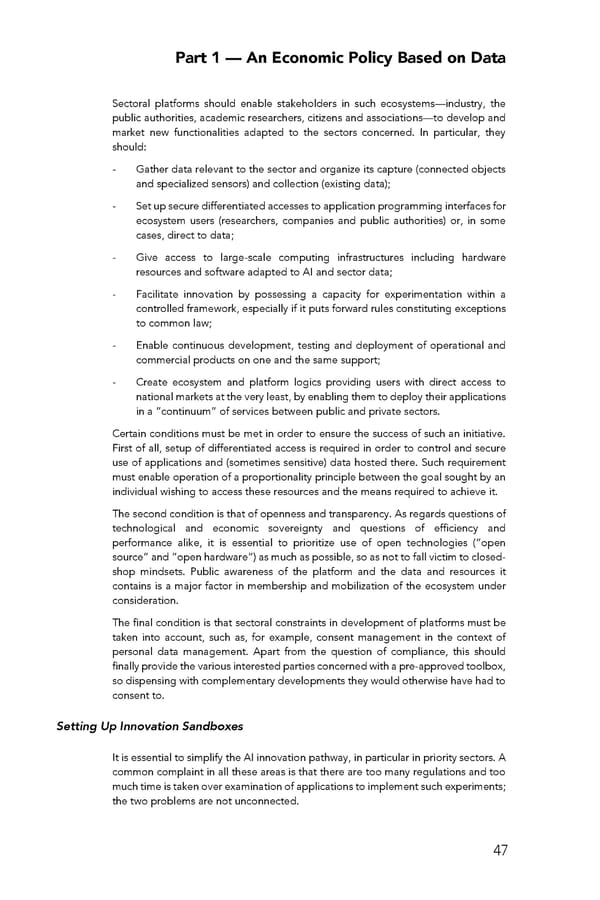Part 1 — An Economic Policy Based on Data Sectoral platforms should enable stakeholders in such ecosystems—industry, the public authorities, academic researchers, citizens and associations—to develop and market new functionalities adapted to the sectors concerned. In particular, they should: - Gather data relevant to the sector and organize its capture (connected objects and specialized sensors) and collection (existing data); - Set up secure differentiated accesses to application programming interfaces for ecosystem users (researchers, companies and public authorities) or, in some cases, direct to data; - Give access to large-scale computing infrastructures including hardware resources and software adapted to AI and sector data; - Facilitate innovation by possessing a capacity for experimentation within a controlled framework, especially if it puts forward rules constituting exceptions to common law; - Enable continuous development, testing and deployment of operational and commercial products on one and the same support; - Create ecosystem and platform logics providing users with direct access to national markets at the very least, by enabling them to deploy their applications in a “continuum” of services between public and private sectors. Certain conditions must be met in order to ensure the success of such an initiative. First of all, setup of differentiated access is required in order to control and secure use of applications and (sometimes sensitive) data hosted there. Such requirement must enable operation of a proportionality principle between the goal sought by an individual wishing to access these resources and the means required to achieve it. The second condition is that of openness and transparency. As regards questions of technological and economic sovereignty and questions of efficiency and performance alike, it is essential to prioritize use of open technologies (“open source” and “open hardware”) as much as possible, so as not to fall victim to closed- shop mindsets. Public awareness of the platform and the data and resources it contains is a major factor in membership and mobilization of the ecosystem under consideration. The final condition is that sectoral constraints in development of platforms must be taken into account, such as, for example, consent management in the context of personal data management. Apart from the question of compliance, this should finally provide the various interested parties concerned with a pre-approved toolbox, so dispensing with complementary developments they would otherwise have had to consent to. Setting Up Innovation Sandboxes It is essential to simplify the AI innovation pathway, in particular in priority sectors. A common complaint in all these areas is that there are too many regulations and too much time is taken over examination of applications to implement such experiments; the two problems are not unconnected. 47
 For a Meaningful AI - Report Page 47 Page 49
For a Meaningful AI - Report Page 47 Page 49